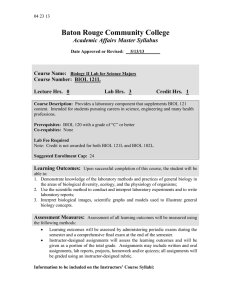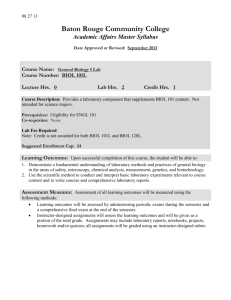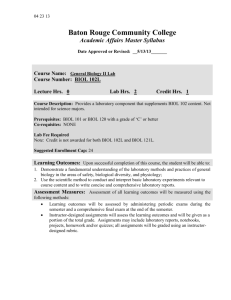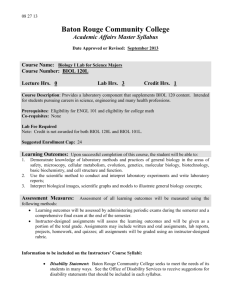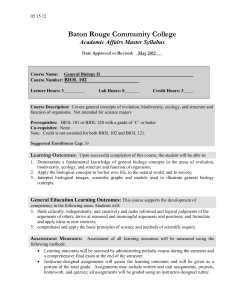Document 11903601
advertisement
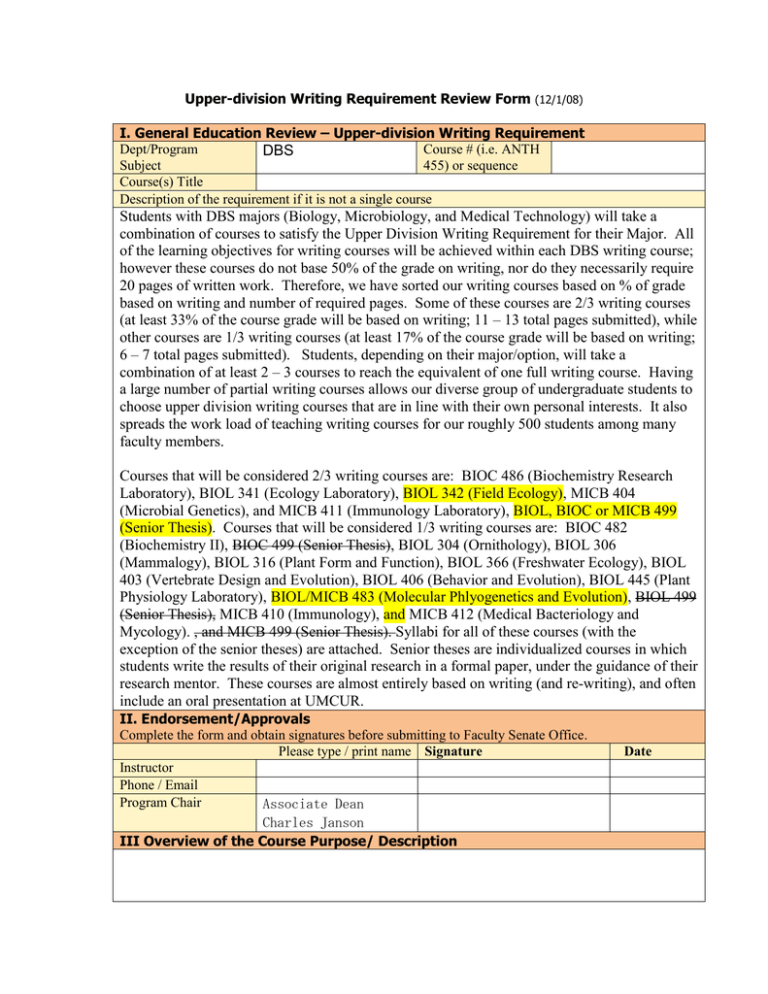
Upper-division Writing Requirement Review Form (12/1/08) I. General Education Review – Upper-division Writing Requirement Dept/Program Course # (i.e. ANTH DBS Subject 455) or sequence Course(s) Title Description of the requirement if it is not a single course Students with DBS majors (Biology, Microbiology, and Medical Technology) will take a combination of courses to satisfy the Upper Division Writing Requirement for their Major. All of the learning objectives for writing courses will be achieved within each DBS writing course; however these courses do not base 50% of the grade on writing, nor do they necessarily require 20 pages of written work. Therefore, we have sorted our writing courses based on % of grade based on writing and number of required pages. Some of these courses are 2/3 writing courses (at least 33% of the course grade will be based on writing; 11 – 13 total pages submitted), while other courses are 1/3 writing courses (at least 17% of the course grade will be based on writing; 6 – 7 total pages submitted). Students, depending on their major/option, will take a combination of at least 2 – 3 courses to reach the equivalent of one full writing course. Having a large number of partial writing courses allows our diverse group of undergraduate students to choose upper division writing courses that are in line with their own personal interests. It also spreads the work load of teaching writing courses for our roughly 500 students among many faculty members. Courses that will be considered 2/3 writing courses are: BIOC 486 (Biochemistry Research Laboratory), BIOL 341 (Ecology Laboratory), BIOL 342 (Field Ecology), MICB 404 (Microbial Genetics), and MICB 411 (Immunology Laboratory), BIOL, BIOC or MICB 499 (Senior Thesis). Courses that will be considered 1/3 writing courses are: BIOC 482 (Biochemistry II), BIOC 499 (Senior Thesis), BIOL 304 (Ornithology), BIOL 306 (Mammalogy), BIOL 316 (Plant Form and Function), BIOL 366 (Freshwater Ecology), BIOL 403 (Vertebrate Design and Evolution), BIOL 406 (Behavior and Evolution), BIOL 445 (Plant Physiology Laboratory), BIOL/MICB 483 (Molecular Phlyogenetics and Evolution), BIOL 499 (Senior Thesis), MICB 410 (Immunology), and MICB 412 (Medical Bacteriology and Mycology). , and MICB 499 (Senior Thesis). Syllabi for all of these courses (with the exception of the senior theses) are attached. Senior theses are individualized courses in which students write the results of their original research in a formal paper, under the guidance of their research mentor. These courses are almost entirely based on writing (and re-writing), and often include an oral presentation at UMCUR. II. Endorsement/Approvals Complete the form and obtain signatures before submitting to Faculty Senate Office. Please type / print name Signature Instructor Phone / Email Program Chair Associate Dean Charles Janson III Overview of the Course Purpose/ Description Date IV Learning Outcomes: Explain how each of the following learning outcomes will be achieved. Typically in lecture courses, students are asked Student learning outcomes : to pursue a question that goes beyond what Identify and pursue more sophisticated they have learned in the course, in order to questions for academic inquiry explore a topic in which they are interested. In laboratory courses, students are often required to ask their own question, and to design their own experiments (with guidance from instructors). Students are expected to use the primary Find, evaluate, analyze, and synthesize literature for the specific field of biology information effectively from diverse sources (see http://www.lib.umt.edu/informationliteracy/) related to the course. They are expected to incorporate this information into their writing (e.g. putting their findings in context of the literature). Students are expected to understand and Manage multiple perspectives as appropriate acknowledge alternative hypotheses in their writing. When their writing is on a controversial topic, they are expected to consider information from all sides. Students are expected to submit papers that Recognize the purposes and needs of conform to editorial guidelines of the journal(s) discipline-specific audiences and adopt the of the specific field related to the course. academic voice necessary for the chosen discipline Use multiple drafts, revision, and editing in conducting inquiry and preparing written work Follow the conventions of citation, documentation, and formal presentation appropriate to that discipline Develop competence in information technology and digital literacy Students are given an opportunity to revise at least one of the written assignments, after the instructor has provided written and/or verbal feedback. Students are expected to submit papers that conform to the individual style of the journal(s) of the specific field related to the course. Students will use scientific database resources (e.g. literature search engines) appropriate to the field of study. V. Writing Course Requirements Check list Is enrollment capped at 25 students? If not, list maximum course enrollment. Explain how outcomes will be adequately met for this number of students. Justify the request for variance. Are outcomes listed in the course syllabus? If not, how will students be informed of course expectations? Are detailed requirements for all written Yes No For some classes, enrollment is capped at 25 or even fewer students. Other courses have larger enrollments (up to 60, but most are closer to 30). All of these courses are partial writing courses, so there are fewer pages to grade overall. In addition, the instructors of these courses often have graduate teaching assistants to help grade assignments. x Yes No Please see attached syllabi. x Yes No assignments including criteria for evaluation in the course syllabus? If not how and when will students be informed of written assignments? Briefly explain how students are provided with tools and strategies for effective writing and editing in the major. Please see attached syllabi. Varies course to course. Some instructors utilize the writing center or library resources; some give writing workshops; some give detailed handouts. All give detailed personal feedback. Will written assignments include an opportunity for x Yes No revision? If not, then explain how students will In all courses, students are given an opportunity receive and use feedback to improve their writing to revise at least one of the written assignments, ability. after the instructor has provided written feedback. Are expectations for Information Literacy listed in x Yes No the course syllabus? If not, how will students be Please see attached syllabi. informed of course expectations? VI. Writing Assignments: Please describe course assignments. Students should be required to individually compose at least 20 pages of writing for assessment. At least 50% of the course grade should be based on students’ performance on writing assignments. Clear expression, quality, and accuracy of content are considered an integral part of the grade on any writing assignment. This varies course to course. In the 1/3 writing Formal Graded Assignments courses, at least 17% of the course grade is based on written assignments of at least 6 -7 total pages. In the 2/3 writing courses, at least 33% of the course grade is based on written assignments of at least 11 – 13 total pages. See above. Informal Ungraded Assignments VII. Syllabus: Paste syllabus below or attach and send digital copy with form. The syllabus should clearly describe how the above criteria are satisfied. For assistance on syllabus preparation see: http://teaching.berkeley.edu/bgd/syllabus.html Paste syllabus here.
